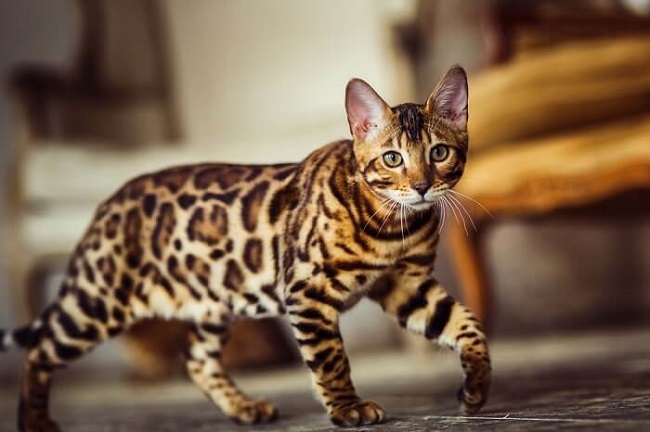Bengal cats, with their wild looks and playful personalities, are a captivating breed. While these feline companions bring joy and dynamic energy to our lives, prospective and current Bengal owners often ask: “What is the lifespan of a Bengal cat?”
This article will provide a comprehensive guide to the Bengal cat lifespan and essential health considerations.

Understanding the Lifespan of Bengal Cats
Bengal cats are generally healthy and robust felines. They typically live between 12 to 16 years, although some can even reach the age of 18 with proper care.
Read Also:
Several factors can influence a Bengal’s longevity, including genetics, diet, environment, and medical care.
Genetic Factors
Like all cats, Bengal’s genetics play a significant role in their lifespan. Breeders have worked hard to breed out early health issues, resulting in the generally healthy Bengals we know today.
Diet and Exercise
Feeding your Bengal a balanced, high-quality diet helps ensure they receive necessary nutrients for a healthy life. Coupled with plenty of exercise, a good diet can contribute to a longer lifespan.
Environment
A safe and stimulating environment is essential for a Bengal’s wellbeing. Whether they’re indoor cats or have access to secure outdoor areas, ensuring their safety from hazards is key to longevity.
Regular Vet Check-ups
Preventive healthcare is vital for catching and treating potential health issues early. Regular vet check-ups are an integral part of this.
Health Considerations for Bengal Cats
While Bengals are generally healthy, they can be susceptible to certain health conditions. Awareness of these can help ensure your cat leads a long and healthy life.
Progressive Retinal Atrophy (PRA)
This inherited disease causes the gradual deterioration of the retina, eventually leading to blindness. Reputable breeders should screen for this condition.
Hypertrophic Cardiomyopathy (HCM)
HCM is a form of heart disease that is found in all breeds of cats but may be more prevalent in Bengals. Regular vet check-ups can help diagnose and manage this condition.
Kidney Issues
Bengals may be predisposed to certain kidney diseases, such as polycystic kidney disease (PKD) and chronic kidney disease (CKD).
Dental Disease
Like all cats, Bengals can develop dental diseases. Regular dental care, including at-home teeth brushing and professional cleanings, can help prevent this.
Ensuring a Healthy Life for Your Bengal Cat
As a Bengal cat owner, your goal should be to maximize your pet’s health and lifespan. Here are a few tips which you can practice to ensure a healthy life to your Bengal cat:
- Feed a balanced, high-quality diet.
- Ensure regular exercise and mental stimulation.
- Schedule regular vet check-ups and vaccinations.
- Maintain a safe and comfortable environment.
- Provide plenty of fresh water and monitor your cat’s water intake.
- Ensure regular dental care.
Read Also:
Conclusion
Bengal cats are known for their playful energy and unique appearance. With a typical lifespan of 12 to 16 years, they can be a long-term companion, bringing joy and dynamic energy to your life.
While their lifespan can be influenced by various factors, proper care, a healthy lifestyle, and regular veterinary check-ups can help ensure that your Bengal lives a long, fulfilling life.
























